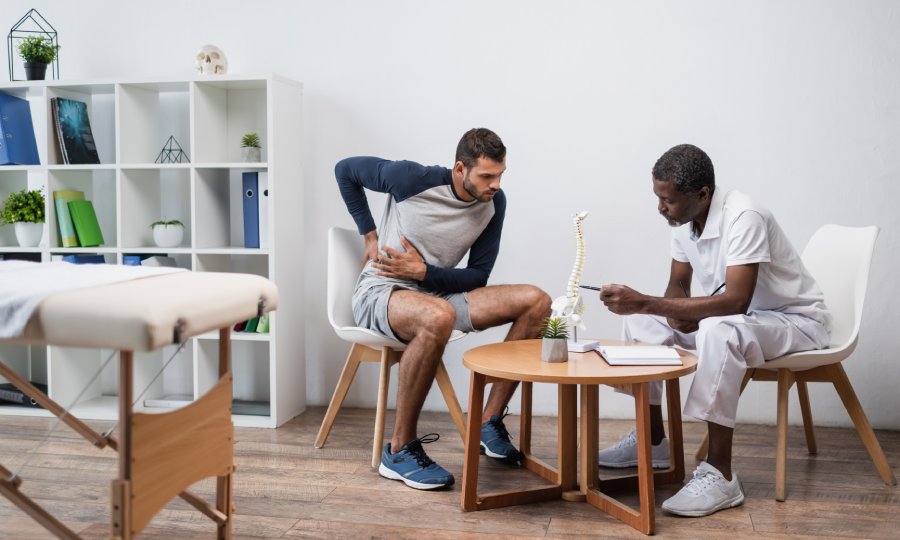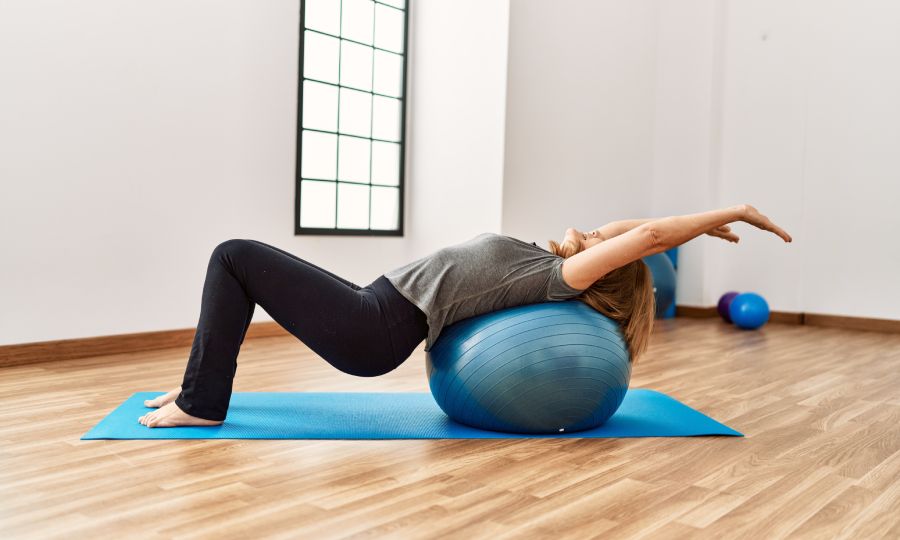Having multiple sclerosis (MS), people are challenged by rapid changes in quality of life and loss of its common rhythm. Suddenly, they are found in a situation where careful management of the disease and the supervision of specialists are required. In this article, we will review rehabilitation process for MS patients, which helps them gain control over the disease and ensure that they are able to live a full life.
Introduction: multiple sclerosis and treatment

What is Multiple Sclerosis?
Multiple sclerosis (MS) is a chronic disease of the central nervous system that affects the brain and spinal cord. MS belongs to the group of autoimmune diseases in which the immune system mistakenly attacks own tissues in the body. In the case of MS, the immune system damages myelin, the protective sheath around nerve fibers. This damage interrupts the normal transmission of electrical impulses along nerve fibers, leading to a variety of symptoms.
Causes and risk factors
The exact cause of MS is unknown. It is likely that the disease develops under exposure of a combination of genetic predisposition and external factors. Some studies show that viruses, certain environmental aspects such as low levels of vitamin D and smoking may increase the risk of developing MS.
Symptoms of multiple sclerosis
Symptoms of MS can vary significantly from a person to a person and can include fatigue, limb weakness, impaired coordination and balance, muscle pain and stiffness, urinary and bowel problems, visual disorders, headaches, depression, and memory and concentration problems.
The typical feature of MS is that symptoms can occur and disappear, which is often referred to as seizures or exacerbations. Between these attacks, patients may experience periods of relative health known as remissions.
Importance of rehabilitation in multiple sclerosis

Goals and objectives of rehabilitation
The goal of MS rehabilitation is to help patients achieve and maintain the maximum functional condition, maintain independence, and improve quality of life. This includes managing symptoms, learning stress coping skills, and learning techniques to help with everyday life.
Principles and approaches in rehabilitation
The main principles of rehabilitation in MS are an individual approach, timeliness, multidisciplinary and systemic approach. The approach should focus on learning any patient the skills that will help them cope with the disease on their own, and providing support to maintain emotional well-being.
Basic principles of rehabilitation of MS patients
MS rehabilitation should be systematic, multidisciplinary, and patient-oriented. It is important to pay attention to the physical health, psychological condition and social functioning of a patient. The key are timely beginning of rehabilitation, its constancy and the individuality of the approach.
Rehabilitation methods for multiple sclerosis

Physical Therapy
Physical therapy or physiotherapy plays an important role in the rehabilitation of MS patients. It helps improve mobility, strength, balance, coordination, and general health condition. It should be noted that the effectiveness of physiotherapy is increased when it is performed regularly. Here are examples of some exercises:
- Stretching exercise. A stretching exercise can be started with a simple ankle stretching exercise. Sitting on the edge of the chair, stretch one leg forward and gently pull the toe toward you. You should feel a stretch in the back of your calf. Repeat this on both legs.
- Strength exercise. To strengthen the muscles of the arms, you can use exercises with dumbbells or elastic bands. Example of the exercise: while sitting or standing, hold dumbbells in each hand, slowly raise and lower your arms, holding your elbows straight.
- Coordination exercises. Exercise “passing the ball” can help improve coordination and balance. Sitting on a chair, take the ball in your hands and pass it from one hand to another while turning to the side. Try to increase the speed of passing the ball over time.
- Balance exercises. Standing on one leg, raise the other leg for a few seconds. You can use a wall or chair to maintain your balance. Repeat this exercise on both legs.
- Endurance exercises. Walking or light jogging, if possible, can help increase overall endurance and support cardiovascular health.
These are just a few examples of exercises that can be used in the MS rehabilitation process. Remember that any exercise should be carried out under the supervision of a qualified specialist and in accordance with the individual capabilities and health of any patient.
Occupational therapy
Occupational therapy helps people with multiple sclerosis adapt to their new physical limitations and learn how to perform everyday tasks such as dressing, cooking, and writing. An occupational therapist may also suggest special devices or adaptive equipment to assist in these tasks.
Speech therapy
Speech therapy is aimed at helping to improve speech and swallowing functions. Some people with MS have difficulty speaking or swallowing due to weakness or miscoordination of the muscles in the throat and mouth.
Psychological support
MS can cause a significant stress and emotional difficulties. Psychological support can help people cope with a diagnosis and manage emotions such as anger, fear, anxiety, and depression. Support groups, individual counseling and meditation can be helpful strategies.
Drug support
Although drug therapy is not a rehabilitation method in the strict sense, it plays an important role in managing the symptoms and exacerbations of MS. Drugs may be used to control aggravations, manage specific symptoms such as fatigue or spasticity, and slow the progression of the disease.
Functional disorders, symptoms and syndromes of MS requiring rehabilitation measures

Functional disorders, symptoms and syndromes
Mobility
Preserving mobility is a key aspect of maintaining independence and quality of life for people with MS. Mobility disorders can be caused by many factors, including muscle weakness, balance and coordination problems, and spasticity. Rehabilitative exercises and strategies aimed at maintaining muscle strength and function, improving balance, and reducing spasticity can be very beneficial.
Fatigue
Fatigue is a common symptom of MS and can have a significant impact on functional ability and quality of life. Fatigue management can include drug treatment, stress management strategies, sleep and rest, and physical exercises.
Impairment of cognitive functions
Impairment of cognitive functions, such as attention, memory, and processing speed, can be a problem for some people with MS. Cognitive rehabilitation, including strategies to improve memory and attention, can be helpful.
Ataxia and tremor
Ataxia (incoordination of movements) and tremors (uncontrollable shaking movements) can be caused by MS. Specific exercises and strategies can help control these symptoms.
rehabilitation measures
Kinesiotherapy
Kinesiotherapy is the use of movement as a therapy to improve strength, flexibility, and overall functioning. In people with MS, this may include exercises to improve balance and coordination, strengthen muscles and increase endurance.
Endurance training
Increasing endurance is an important goal of rehabilitation for people with MS. This can be achieved through regular cardio exercise, which can also help control fatigue levels.
Strength trainings
Strength trainings can help maintain muscle mass and strength, which is especially important for people with MS, who may suffer from muscle weakness or atrophy.
Combined trainings
Combined trainings that include elements of strength and aerobic training, as well as balance and coordination training, may be most effective in maintaining overall functionality.
Telemedicine in rehabilitation
Telemedicine can be a useful tool to provide access to rehabilitation services for those who live in remote areas or have transportation difficulties. It can also allow patients to do their exercises at home, in a more convenient and comfortable environment.
Robotic mechanotherapy
Robotic mechanotherapy uses technology to help patients perform exercises or movements that they may find difficult or impossible without support.
Functional electrical stimulation
Functional electrical stimulation (FES) uses weak electrical impulses to stimulate muscles that may be weak or paralyzed. This can help improve muscle function and reduce spasticity.
Hydrokinesiotherapy
Hydrokinesiotherapy or hydrotherapy uses the properties of water, such as body support and resistance, to help in exercise and movement. This can be especially helpful for people with MS who have problems with balance or stability.
Occupational therapy
Occupational therapy aims to help people with MS perform daily tasks and activities, such as dressing, cooking, and driving.
Dance therapy
Dance therapy can be a fun and effective way to improve physical function and general well-being in people with MS. It can help improve strength, balance, flexibility, and coordination, as well as improve mood and self-esteem.
Balance therapy using a stabilometric platform and other new gaming technologies
Balance therapy using a stabilometric platform and other new gaming technologies can be useful tools in a rehabilitation program for people with MS. They can offer a fun and motivating way to improve balance and coordination.
Video: “Rehabilitation of the patients with Multiple Sclerosis”
For additional information about Rehabilitation of the patients with Multiple Sclerosis you can watch a video demonstrating exercises and rehabilitation recommendations.
Advantages of using GHRS-GROUP recovery methods

The recovery methods offered by GHRS-GROUP include features and innovations that offer advantages over traditional approaches.
Availability of home recovery
One of the key advantages is the ability to perform rehabilitation procedures at home. This provides patients with convenience and comfort, allowing them to stay in a familiar and safe environment. Patients can avoid the potential stress and inconvenience of visiting clinics or other healthcare facilities.
Israeli rehabilitation protocols
GHRS-GROUP rehabilitation methods are based on Israeli protocols, which are considered to be among the most advanced and effective in the world. These protocols are developed with the latest scientific research and clinical experience and offer a holistic approach to recovery that includes many aspects of patient functioning.
Individualized approach
Every patient with multiple sclerosis is unique, and an individualized approach is of great importance for GHRS-GROUP. A rehabilitation plan is developed with regards to each patient’s specific needs, goals, and limitations, maximizing recovery effectiveness.
Complex rehabilitation
At GHRS-GROUP, we provide access to video exercises that are grouped into ready-made complexes. In addition, our specialists are able to develop a personalized set of exercises, taking into account individual needs and health condition of each patient. Using this approach, patients can exercise in the comfort of their own homes.
Professionalism and quality
We are proud of the high level of professionalism of our colleagues and the quality of the services we provide. All the specialists in our team are highly qualified and are constantly working to improve their skills and knowledge in order to create the best possible conditions for the recovery of our patients.
Long-term recovery strategies
We do not only help our patients recover from exacerbations, but we also develop long-term strategies and plans to manage MS symptoms and maintain functionality on a long-term basis. Our goal is to help our patients maintain the best possible quality of life despite the progressive nature of the disease.
Real-life stories of recovery in multiple sclerosis

Victor’s Story: Overcoming muscle weakness and improving mobility
Victor, a 45-year-old patient diagnosed with multiple sclerosis, came to us with problems related to muscle weakness and reduced mobility. We have developed an individual set of exercises for him with an emphasis on restoring muscle strength and improving motor activity. After a few weeks of regular trainings, Victor noticed a marked improvement: he was able to walk around the house and even climb stairs without any help. This was an important step in his recovery process, which confirms the efficacy of our complexes of exercises.
Anna’s story: fighting fatigue and Declining Stamina
Anna, 38 years old, experienced extreme fatigue and decreased endurance after being diagnosed with MS. We have developed an individual set of exercises for her, including both physical activity and relaxation and recovery techniques. After a few weeks of training with our methods, Anna noticed that fatigue began to interfere less with her everyday life, and endurance increased. This experience confirms the efficacy of our techniques in managing MS symptoms.
These stories confirm that, despite the complexity and variety of multiple sclerosis symptoms, a correct set of rehabilitation exercises can significantly improve the quality of life of patients and help them overcome many of the difficulties related to the disease.
Life and rehabilitation

Multiple sclerosis turns the rehabilitation process into something more than just a single treatment course. It becomes a way of life, a daily practice that patients incorporate into their daily routine. Monitoring and managing symptoms, constantly taking care of their physical and emotional health, having exercises and therapies, and regular visits to physicians and specialists become part of the normal lifestyle of people living with MS.
The goal of rehabilitation programs, such as the ones that we offer at GHRS-GROUP, is to make this new lifestyle as comfortable and efficient as possible. We offer individualized rehabilitation plans that address each patient’s unique needs and help them use their resources as much as possible to maintain quality of life.
So, while working with us, patients will learn not only to cope with the symptoms of the disease, but also to adapt to new living conditions, maintaining activity and independence as much as possible. This means not only recovery after aggravations, but also constantly managing your health, including physical activity, adequate diet, stress reduction, and providing psychological support.
In this sense, life after rehabilitation does not mean returning to previous patterns of behavior, but acquiring new healthy habits that help patients manage their disease and continue to lead an active and fulfilling life.

Check out the demo version of our sets of exercises for Multiple Sclerosis on YouTube
You can find more information about Multiple Sclerosis in our Library of Articles.
Our website presents the following sets of exercises for the rehabilitation of the patients with Multiple Sclerosis:
-
MULTIPLE SCLEROSIS. EXERCISES FOR STRETCHING AND IMPROVING BODY FLEXIBILITY AND JOINT MOBILITY, REDUCING TONE
-
MULTIPLE SCLEROSIS. EXERCISES TO STRENGTHEN THE MUSCULOSKELETAL AND MUSCULAR SYSTEM, ENDURANCE
-
MULTIPLE SCLEROSIS. EXERCISES TO IMPROVE COORDINATION, BALANCE AND GAIT
-
MULTIPLE SCLEROSIS. STRETCHING AND WORKING WITH A MASSAGE ROLLER. ADVANCED STAGE OF REHABILITATION














